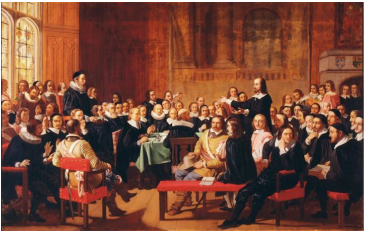After the failure of an expedition of plunder into the French colony of Quebec, the General Court (legislature) of the colony of Massachusetts passes the Currency Act of 1690, authorizing the issuing of 7,000 paper “pounds” (Bills of Credit) to pays its mercenary soldiers. Soldiers of fortune from previously successful foreign adventures were paid out of the booty they seized. The loot was typically used to pay mercenary soldiers, but when one of the expeditions failed and the soldiers threatened mutiny, the Massachusetts government printed 7,000 British pounds in paper notes to pay them.
Postscript: Public suspicion over the Notes led to a 40% depreciation (inflation) in their value against lawful money (gold or silver coin) in just the first 12 months of their existence. It took the GC 40 years to fully redeem theses promissory notes for lawful money (gold or silver coin).
[added 10/26/2024] Thanks to Freedom’s Phoenix for this entry.
Subsequent Events:
Authority:
“Law of the Jungle”
ccc-2point0.com/preface
References:
The American Conservative — Inflating War
www.amconmag.com/article/2010/aug/01/00016/
The First Printed Currency – 1690
coins.nd.edu/ColCurrency/CurrencyIntros/IntroEarliest.html


